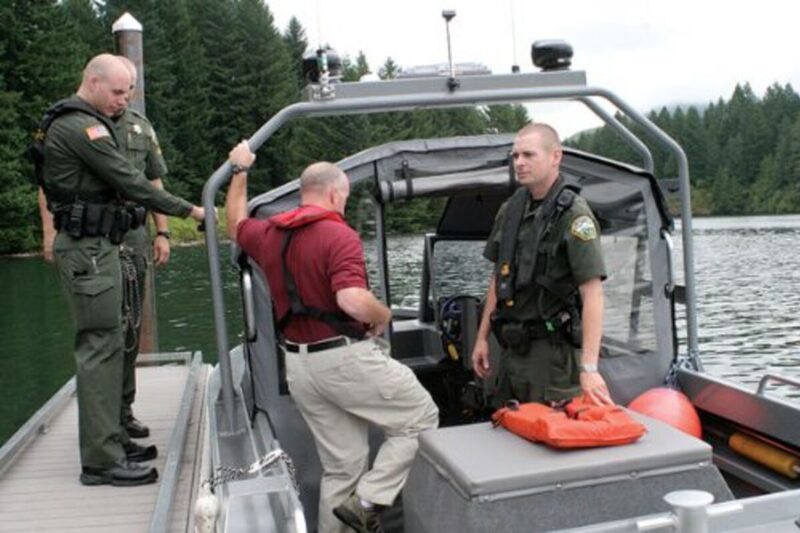Sean C. Morgan
The Linn County Sheriff’s Office has put a new boat on the county’s rivers and lakes, removing a 1987 Almar from its two-boat fleet.
The last time LCSO purchased a new boat was in 2000.
The new boat cost $43,000, said Undersheriff Bruce Riley. The 19-foot North River boat is powered by a Chevy 350 engine. LCSO sold the Almar for $6,600. The proceeds helped pay for the new patrol boat, along with federal funds through the Oregon Marine Board.
The new boat will be used on the lakes during summer months, Riley said. In the winter, it will work on the rivers.
The new North River includes a better canopy, covering the center console. It also allows the driver to remain seated, while the 2000 North River model has required the driver to stand up.
The new boat also is set up to handle the deputies’ laptops, from which they can access any records they need anywhere they can get cell service.
The deputies can carry on conversations, even when the boat is on plane, with the boat’s new radio headsets, said full-time Marine Deputy Dan Wittekind.
LCSO got the craft on the water during Sportsman’s Holiday weekend, Wittekind said. “It’s been a great boat.”
LCSO demonstrated the boat to members of Linn County media on Thursday.
“We wanted to come out and do more of a formal hand-off of the key,” said Marine Board Director Scott Brewin, partly to reflect the relationship that the Sheriff’s Office has in educating boaters.
Marine Board officials hoped to fund boats in six counties this year, Brewin said. The counties got together and had discussions about what counties needed boats, which boats were in the worst shape and what the biggest needs were. The Marine Board also asked what counties could do to help out.
It’s about partnerships, Brewin said. The counties were able to help stretch the Marine Board’s purchase to nine boats in eight counties, including Linn, Polk, Curry, Crook, Wasco, Yamhill, Washington and Umatilla. The average age of sheriff’s boats in the state is 18 years.
Linn County was on the bubble, Brewin said, and Linn County’s willingness to help purchase the boat benefited it.
Riley said Linn County has had a contract with the Oregon Marine Board many years, back into the 1970s, he believes.
“Apparently, we were one of the first counties in the state to do that,” Riley said.
When he started working at LCSO in 1987, the contract required three seasonal marine deputies, Riley said. They were usually reserve deputies or young men trying to get law enforcement experience. About a dozen years ago, LCSO added a full-time deputy position to the team.
It’s been a good relationship between LCSO and the Marine Board, Riley said. With Foster and Green Peter reservoirs, rivers and the high lakes, such as Clear Lake, Big Lake and Lost Lake, “water safety’s huge.”
The marine deputies handle a variety of tasks, he said.
Mostly, they provide public relations and education, inspecting boats on the lakes, he said. They don’t aggressively write citations.
Boaters know the marine deputies are out, and they frequently seek out the deputies for their annual boat inspections, the most common activity for the marine deputies, said Wittekind.
This year, the deputies have been stricter on boating under the influence, Riley said.
“In fact, we keep such a high pressure on it, most people usually drink it on shore and keep it on shore,” Wittekind said. Laws have been changing, although alcohol is still legal on boats.
Marine deputies also deal with boaters speeding in 5-mph no-wake zones and water-skiers moving the wrong direction, clockwise around the lake.
They spend time helping with the recovery of cars and diving too, Riley said. They also help recover stolen items that are often dumped over the bridge at Waterloo.
Mostly, the deputies find a lot of friendly people, Wittekind said.
Lake usage has been a little low this year mostly because of the weather, Wittekind said. Woody debris in Foster Lake was a problem early in the season, but boaters just moved up to Green Peter.
Fortunately, Parks Director Brian Carroll and his department jumped on the problem and cleared the lake under a permit from the U.S. Army Corps of Engineers, Riley said.
The water patrol program costs $255,000 annually, Riley said. The Oregon Marine Board provides $151,000, and the county covers the remainder with cash and in-kind.
If the Marine Board wasn’t a partner in this, the county wouldn’t be able to provide the services, Riley said, even though the county is responsible for it. Failure to provide the marine patrols would have a ripple effect. Alcohol-related problems, for example, would start on the water and continue onto the shore.
“The work these guys do out there is to keep everybody safe and make sure everybody has a good time,” Brewin said.





